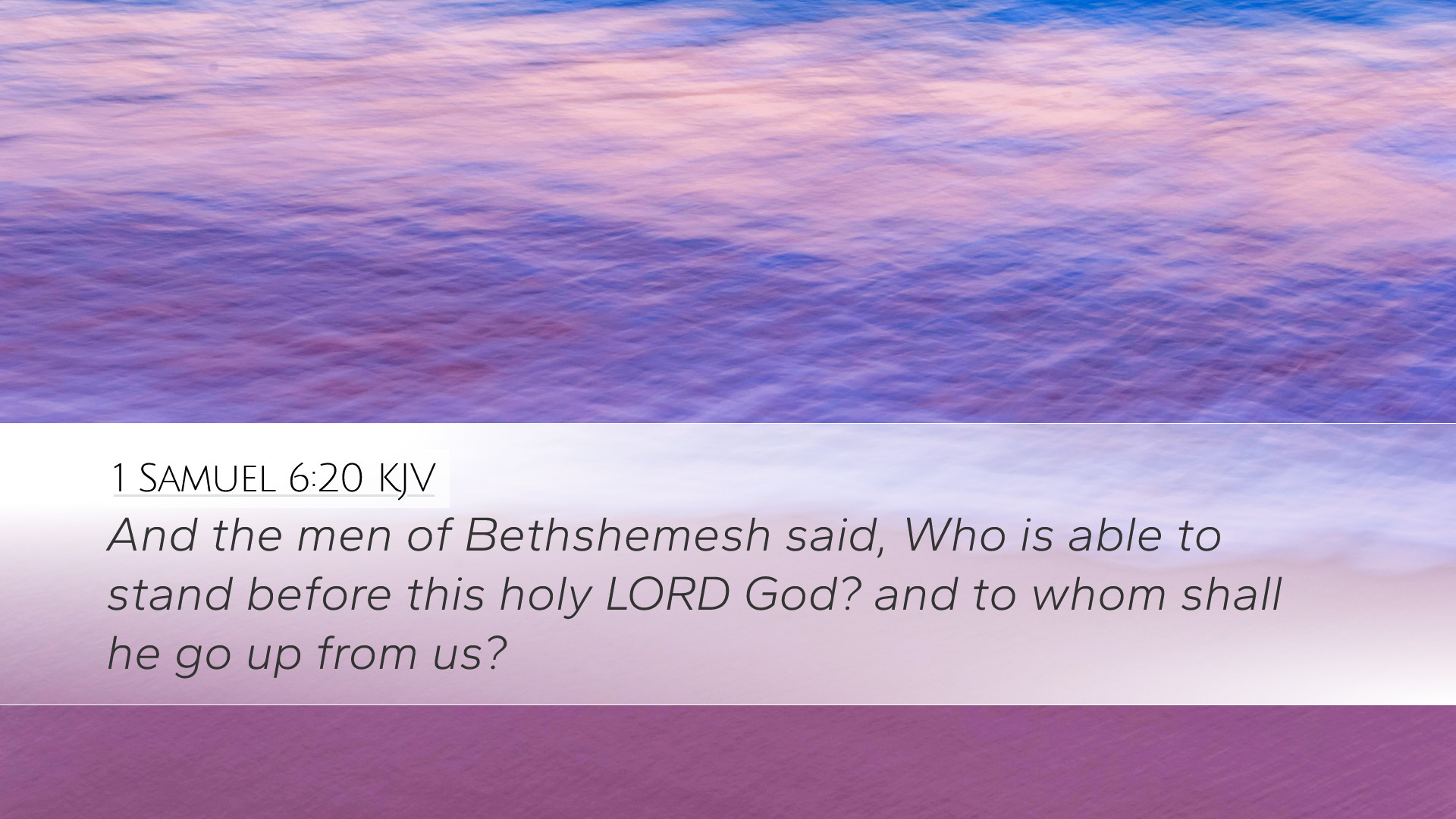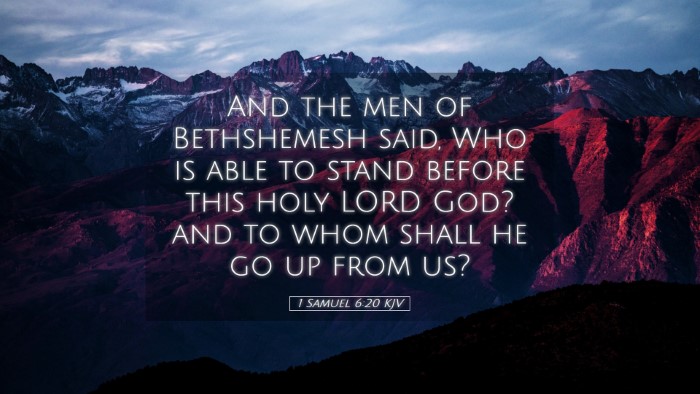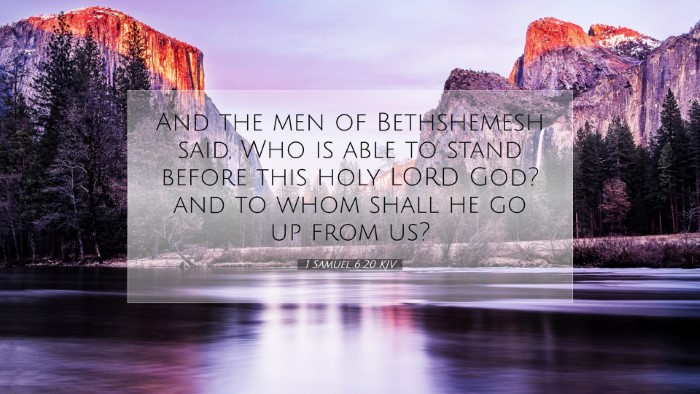Commentary on 1 Samuel 6:20
1 Samuel 6:20 states: "And the men of Bethshemesh said, Who is able to stand before this holy Lord God? and to whom shall He go up from us?" This verse occurs in the aftermath of the return of the Ark of the Covenant to Israel, following its capture by the Philistines. The events following this moment are rich with theological significance and contribute to our understanding of God's holiness, human sinfulness, and the nature of divine justice.
Context of the Verse
The Ark of the Covenant held immense significance for the Israelites as it represented God's covenant presence among His people. The capture of the Ark by the Philistines (1 Samuel 4) signified God's judgment against Israel for their unfaithfulness. Its return, however, was fraught with tension, as its arrival raised profound questions about holiness, sin, and the fear of the Lord.
Insights from Public Domain Commentaries
Matthew Henry's Commentary
Matthew Henry emphasizes the inviolable holiness of God, suggesting that the men of Bethshemesh were overwhelmed by the realization of God’s majesty and the severity of sin. He notes that their rhetorical question reflects their understanding of God’s nature: “Who is able to stand before this holy Lord God?” reveals a recognition that the holiness of God stands in stark contrast to human impurity. The men recognized that God's presence is a heavy weight of glory that cannot be trifled with.
Moreover, Henry points out that the people were effectively acknowledging their inability to approach God without mediation. This acknowledgment of sinfulness leads to a profound sense of the need for an intermediary, which is central to understanding God’s relationship with humanity. Henry suggests that it foreshadows the ultimate mediation provided by Christ.
Albert Barnes' Notes
Albert Barnes provides additional insight by examining the historical context and the mindset of the Israelites. He points out that the Ark's return was not merely a physical event but carried with it implications of divine authority and judgment. Barnes notes that the calamities experienced by the Philistines during the Ark's captivity (1 Samuel 5:6-12) testify to God’s sovereign power, thus recognizing that any human interaction with the divine requires holiness and reverence.
Barnes also stresses the fearful inquiry of the Bethshemites, which underscores a key theme of scripture: that to stand before God requires a certain level of respect and moral integrity. They instinctively recognized that their status before God was one of vulnerability due to their sin, driving their question about God’s departure. This acknowledgment of frailty has implications for all believers today as they approach holiness embodied in God.
Adam Clarke's Commentary
Adam Clarke elaborates on the fear and reverence exhibited by the men of Bethshemesh. He interprets the phrase "to whom shall He go up from us?" as a genuine lament, implying their desire to escape the condemnation brought on by the Ark’s arrival. Clarke indicates that they feared the repercussions of interacting with the divine presence, a rightful perception considering their past actions and the consequences they had already faced.
Clarke also reflects on the broader implications of divine holiness, emphasizing that recognition of our unworthiness before God is essential for genuine faith and worship. He asserts that we must recognize our own sinful state in light of God’s holiness to approach Him rightly. This perspective serves a profound purpose in guiding believers today to humble themselves before a transcendent God.
Theological Implications
This verse and its surrounding narrative resonate with several core theological concepts:
- The Holiness of God: The holiness of God demands a serious response. Believers are cautioned to approach God with the recognition of His purity and their sinfulness.
- Human Sinfulness: The question posed by the men of Bethshemesh illustrates an essential doctrine: the inability of humanity to stand before God in their own strength. It speaks to the pervasive nature of sin and the need for repentance.
- Need for Mediation: Their fearful questioning foreshadows the necessity of a mediator. In Christ, we see the fulfillment of this need, providing access to God through His atoning sacrifice.
- Divine Sovereignty: The return of the Ark after calamities experienced by the Philistines showcases God's sovereign control over nations and His ability to redeem His people.
- Community Awareness: Their collective acknowledgment of their plight encourages a community understanding of God’s nature and the awareness of corporate sinfulness.
Application for Today's Believers
For today’s pastors, students, theologians, and Bible scholars, 1 Samuel 6:20 serves as a poignant reminder of the need for reverence when approaching God. The question posed by the men of Bethshemesh serves as a template for our self-examination in worship:
- Recognize God’s Holiness: Acknowledge the holiness of God in our worship and daily lives, drawing near only through the grace provided by Jesus Christ.
- Cultivate Humility: Understand that humility is part of our relationship with God, recognizing our unworthiness.
- Promote Accountability: Encourage community reflections on God's holiness and invite others to share in the recognition of our collective need for grace.
- Teach the Doctrine of Mediation: In preaching and teaching, emphasize the role of Christ as our mediator between God and humanity.
Conclusion
In summary, 1 Samuel 6:20 invites both a solemn reflection and a profound recognition of the nature of God and the human condition. The insights gleaned from commentators like Matthew Henry, Albert Barnes, and Adam Clarke highlight essential truths that extend beyond the text and into the lives of believers. Through their insights, we are reminded to uphold God’s holiness, acknowledge our sinfulness, and approach Him with reverent humility.


